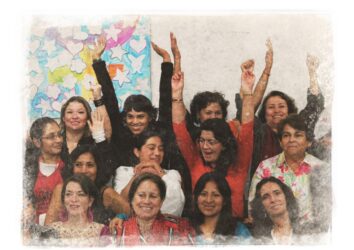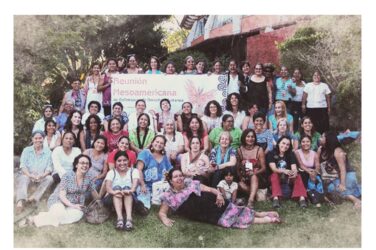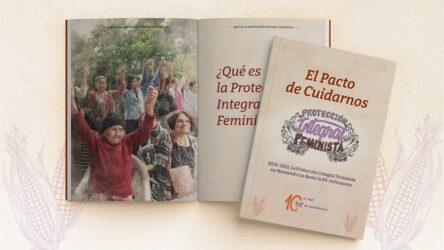The Pact to Take Care of Us. 2010-2021: Comprehensive Feminist Protection in Mesoamerica from the IM-Defenders. Courtesy: IM-Defenders
*The PIF is the way in which defenders and communities accompany each other when they are attacked.
The Mesoamerican Initiative of Women Human Rights Defenders (IM-Defenders) public “The Pact to Take Care of Us. 2010-2021: Comprehensive Feminist Protection in Mesoamerica from the IM-Defenders”a text that emerges from the 2010 meeting, where experiences of violence that touched their bodies and lives were shared.
In the meeting that took place in Oaxaca 12 years ago, the defenders agreed to take care of themselves and protect themselves together, that is, the Comprehensive Feminist Protection (PIF).
Today, the PIF brings together more than two thousand defenders and 300 organizations in national and territorial networks and in a regional space.
Thus, the Initiative reflects in its publication the experience of more than 10 years of collective construction and implementation of the PIF.
In the text, the voices of women defenders from El Salvador, Honduras, Mexico and Nicaragua tell a little piece of their story and walk togetherso that their individual and collective struggles survive the violence and continue to flourish.
What is the PIF?
According to IM-Defensoras, it is a vision and political practice that is based on four main pillars: the first is to put care at the center of your activismbecause it is a right, vital necessity and basic principle of the world that they want to build.
Collective care is what allows our struggles to continue and that our lives are not silenced by violence, they specify in the publication.
The second is to recognize themselves as unsubjectablesince women defenders are diverse and transgressive, subject to policies present in all social movements and who have their own needs and ways of understanding protection.
In the third pillar is her intersectional feminist look at the context and risk. By questioning the capitalist, racist, and patriarchal system that hurts their bodies and territories, from this point of view they use a notion of expanded risk to recognize the specific violence that impacts them personally and collectively, taking into account all the oppressions that go through them. .

Photo: National Network of Women Defenders of Mexico
Regarding the fourth pillar, they indicated that it is summarized in the phrase: “The nets save!”. Well, they understand protection as a process and collective capacity that allows them to take care of themselves together, in community, territories and from their own knowledge.
These pillars are put into practice through seven strategies: networks of defenders, communicate and influence, digital care, register attacks, healing, mobilize resources, accompany and systematize.
At the heart of the IM-Defenders are the networks of defenders. We are more than two thousand defenders and 300 organizations in El Salvador, Honduras, Mexico and Nicaragua; articulated in national and territorial networks where compañeras from very diverse social movements come together, detailed the defenders.
In addition, they emphasized that they do accompaniment work in situations of risk and violence. So that, They carried out 2,808 actions to accompany women defenders at risk in 2021.
We understand accompaniment in a comprehensive way and we carry it out both with defenders individually and in processes that include their families, organizations and communities, they explain in their publication.
Their actions include: risk analysis, physical, psychosocial and digital protection measures, urgent alerts, incidence before authorities and human rights mechanisms, relocations inside and outside the countries, including protection houses, attention to basic needs and solidarity actions.
In addition to this, they build reflections and processes of self-care, collective care and healing that contribute to changing the traditional way of understanding protection, questioning sacrificial models of activism and placing care at the center of their political action.
On the other hand, they recognized that they have the right to take care of themselves and attend to their needs. “We take care of ourselves together, in community; and learning from women and native peoples”, since it favors healing, understood as the process that recovers ancestral wisdom and the connection with mother earth and spirituality.
This is done through self-care days, stays in their La Serena and La Siguata respite and healing homes, as well as diagnoses, resources, training processes, accompaniment.

Photo: IM-Defenders
In addition, they have a regional registry of attacks, that is, they systematically analyze and with a common methodology the violence that impacts them as human rights defenders.
Until 2020, They documented more than 17,000 attacks perpetrated against more than 5,000 defenders in El Salvador, Guatemala, Honduras, Mexico, and Nicaragua. For this reason, they carry out communication, advocacy and digital security for protection: denouncing the violence they face through alerts, pronouncements and various materials and communication channels.
In addition to this, they give voice and visibility to their struggles and forms of protection, influencing State actors and human rights mechanisms, accompanying and training defenders in digital care and building alliances for agreement and solidarity.
We carry out constant work to mobilize resources to develop our own strategies and forms of protection with autonomy, sustainability and in the best conditions, they specified in their publication.

“El Pacto de Cuidarnos” is published, ten years of comprehensive feminist protection

